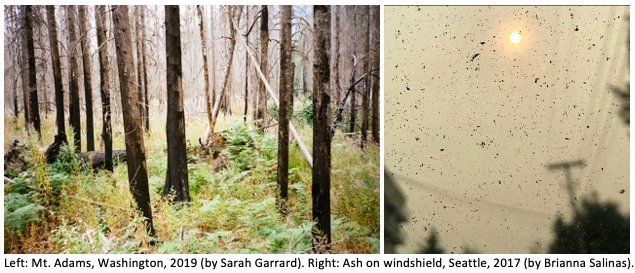
Must the flame lick our doorstep / before we acknowledge the fire?
Wildfire season has returned to the West Coast with exceptional fury. Year after year, the fires start earlier and are contained later, ravaging homes and businesses, millions of acres of land, and countless animal and human lives.
In 2020 several fires continued blazing into December, and 2021 threatens to be similarly catastrophic. According to a report by CNN, wildfires have already burned around 3 million acres this year––an area greater than that of Rhode Island and Delaware combined. On the heels of a record-breaking heatwave, with moderate to severe drought affecting over 90% of land in California, Oregon, and Washington, conditions are unlikely to improve any time soon.
In the face of such catastrophes, there are several ways to protect ourselves and our neighbors. Every year, many sectors work together to do just that. Translation and interpretation represent two of the less obvious––but tremendously important––ones.
Language access services are indispensable in times of crisis, whether personal, local, or global. These fires underscore our undeniable need for multilingual emergency alert systems (for earthquakes, hurricanes, and other severe weather events as well).
“A recent report in Grist highlighted the importance of providing accurate and human-developed translations of public safety warnings, in order to ensure that we don’t leave behind individuals with limited English proficiency in our response to natural disasters,” says Andrew Warner, a California journalist writing for
Multilingual.com.
Warner explains that quality translations of crucial public-safety information about wildfires are limited, if available at all. According to U.S. Census data, some 44% of California residents speak a language other than English at home (Spanish accounts for roughly 28%), and yet a 2017 state audit found that in several of the counties most affected by these fires––“some of the most severe … in the state’s history”––residents had not received “adequate warnings in languages other than English.”
The numbers don’t look much better in Washington or Oregon, where 20% and 15% of the states’ respective residents do not speak English at home. In the rural areas of both states––those hardest hit by wildfires––hese numbers increase exponentially. In Eastern Washington’s Adams County, for example, roughly 50% speak Spanish at home.
Some communities have turned to services such as Google Translate to improve the accessibility of their emergency alerts by broadcasting them in more than one language, but machine translations are not always reliable. Warner cites an example from Ventura County, California, where “in 2017, an automatic translation of a wildfire notice … mistranslated … ‘brush fire’ using the Spanish word for ‘hairbrush.’” This may seem more comical than alarming but, when time is of the essence, accuracy is key. Avoiding confusion can save lives.
Whatever the disaster and whatever our politics, proficiency in a given language (or lack thereof) should never impede one's access to critical information about threats to their personal security.
Information about preparedness, evacuation, and safe sheltering should always be of quality and readily available to all residents of our diverse society. It is therefore critical that local government entities (along with community groups and faith-based organizations) employ more human translators in their efforts to spread the word––quickly, clearly and without equivocation.
Doing so could be the difference between home and homeless, or life and death.